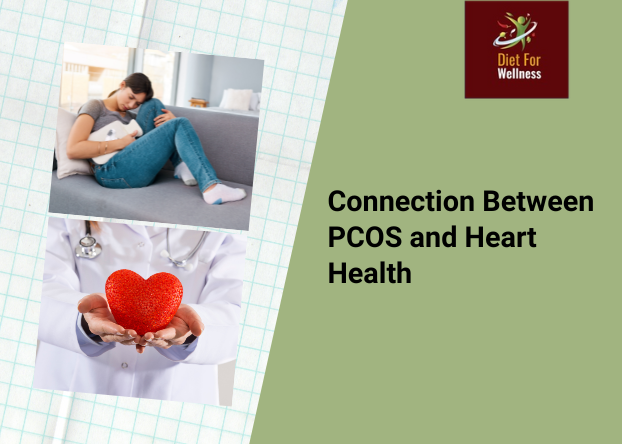Connection Between PCOS and Heart Health

Polycystic Ovary Syndrome (PCOS) is commonly understood as a condition primarily impacting reproductive health, characterized by its effects on sex hormones, leading to symptoms like irregular menstrual cycles, infertility, acne, excessive body hair growth, and weight gain. However, the hormonal shifts associated with PCOS can also significantly influence cardiovascular health.
How Does PCOS Affect the Heart?
PCOS is marked by elevated levels of androgens, often referred to as “male” hormones. This hormonal imbalance can lead to inflammation and oxidative stress within the heart and blood vessels, increasing the risk of various cardiovascular issues, like the following
- Atrial fibrillation (A-fib)
- Heart attack
- High blood pressure (hypertension)
- Elevated LDL (“bad”) cholesterol
- Insulin resistance
- Stroke
- Type 2 diabetes
Science-Backed Ways for Protecting Your Heart
While the potential impact of PCOS on heart health can be concerning, proactive steps can be taken to manage these risks effectively.

1. Get Screened Regularly
Many cardiovascular risk factors, such as high blood pressure or cholesterol, often present without noticeable symptoms. Therefore, even if you feel well or believe you’re not susceptible to heart disease due to age, regular heart health screenings are essential. Consult your healthcare provider about screenings for
- A1C (average blood sugar over 2-3 months)
- Blood pressure
- Cholesterol levels
- Fasting glucose (current blood sugar snapshot)
- Triglycerides
- Waist circumference (indicator for heart disease and Type 2 diabetes risk)
2. Incorporate Exercise
Moderate-intensity physical activity, such as walking, biking, or swimming, is highly beneficial for heart health. Go for at least 150 minutes of moderate exercise per week (30 minutes a day, five days a week). If this seems challenging, remember that even small amounts of exercise offer health benefits. You can also break down your exercise sessions; for example, try three 10-minute walks instead of one 30-minute walk.
Also, strength training, including resistance exercises or weightlifting, contributes to heart health. Target two 30-minute strength training sessions per week.
3. Balance Your Diet
Achieving better cardiovascular health doesn’t require extreme dietary restrictions. Focus on consuming more whole, unprocessed foods to help prevent insulin resistance and inflammation. These include diverse fruits and vegetables, lean proteins like fish, legumes, nuts, and poultry, small quantities of heart-healthy oils such as olive and canola, and whole grains
On the other side, minimize your intake of foods that promote inflammation, particularly those high in added sugars, salt, and saturated and trans fats.
4. Prioritize Sleep
Chronic sleep deprivation can increase your risk of high blood pressure, Type 2 diabetes, and other heart-related concerns. Individuals with PCOS also face a higher risk of obstructive sleep apnea (OSA), which further disrupts sleep. This link between PCOS and sleep apnea is often attributed to elevated androgen levels, insulin resistance, and excess body weight.
Cultivate healthy sleep habits, such as maintaining a consistent sleep schedule and avoiding screens for two hours before bedtime. If sleep difficulties persist, consult a doctor. She/ he may recommend a sleep study, a continuous positive airway pressure (CPAP) device, or medication.
5. Manage Stress
Everyone experiences stress, but prolonged, high stress levels can contribute to increased blood pressure and inflammation, and negatively impact mental well-being. Dedicate time to stress-reducing activities, such as deep breathing exercises, walking or dancing, listening to music, meditation, and yoga.
6. Work Towards a Healthy Weight
Weight management can be difficult, but even a little weight loss can bring significant benefits. If you are overweight, losing just 5% to 10% of your body weight can improve insulin sensitivity and potentially restore regular menstrual cycles in those with PCOS. If you need additional support with weight management, discuss options with a trusted nutritionist and medical practitioner.
7. Stick to Your Treatment Plan
Research indicates that metformin can be beneficial for individuals with PCOS by lowering androgen levels and enhancing insulin sensitivity. Some individuals may also require medications for heart health, such as those that lower blood pressure or cholesterol. It’s important to take all prescribed medications as directed and to have regular check-ups with your doctor to review the effectiveness of your treatment.
Living Well with PCOS is Possible
While managing PCOS symptoms and the associated heart health risks can be challenging, opting for dietary modifications and lifestyle adjustments and collaborating with your doctor can empower you to lead a healthier, more active life with PCOS.
